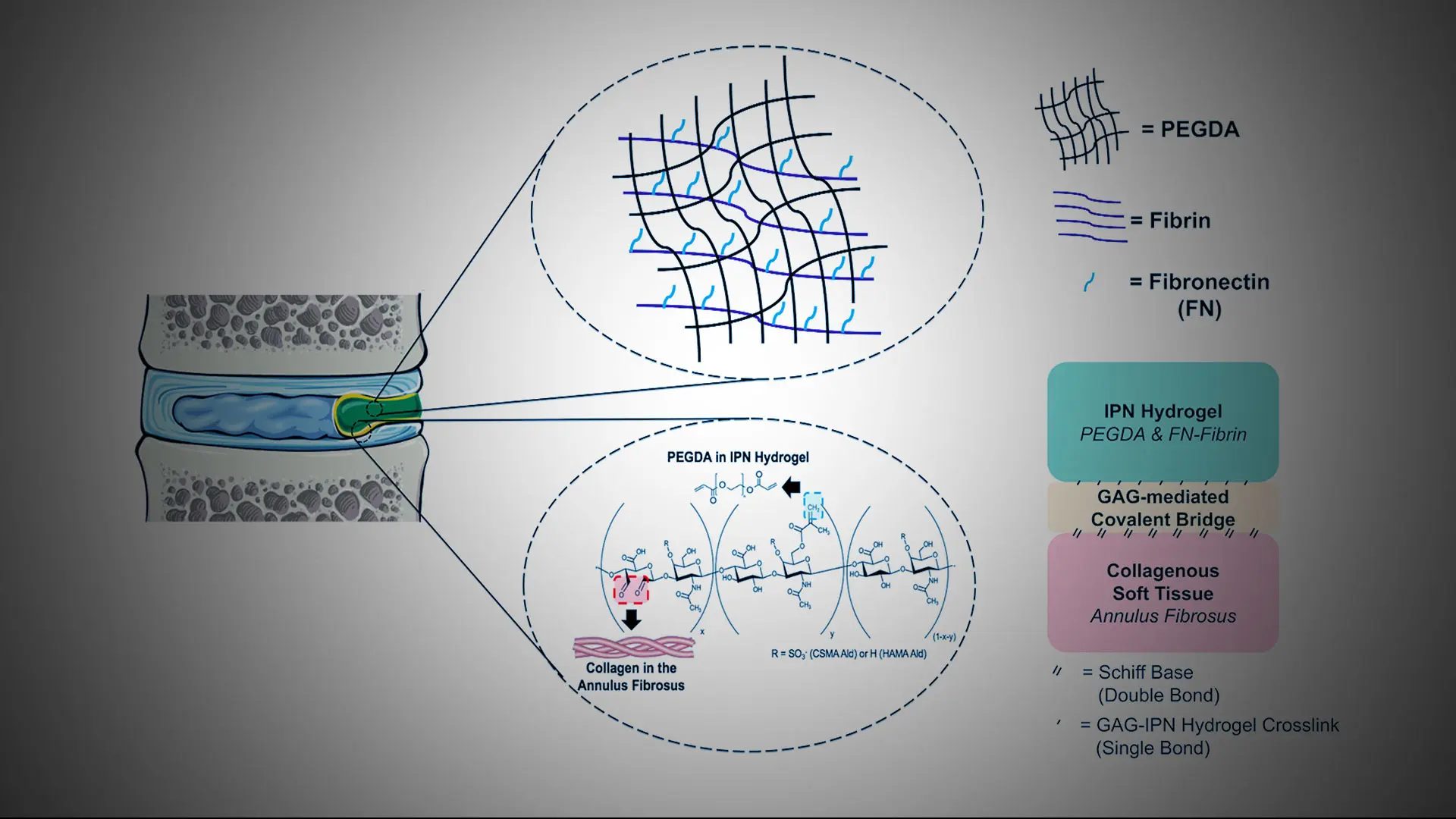For Six Years, Mount Sinai’s Leading Neuroscientist
Has Been Steadily Guiding the Career of This MD/PhD Candidate
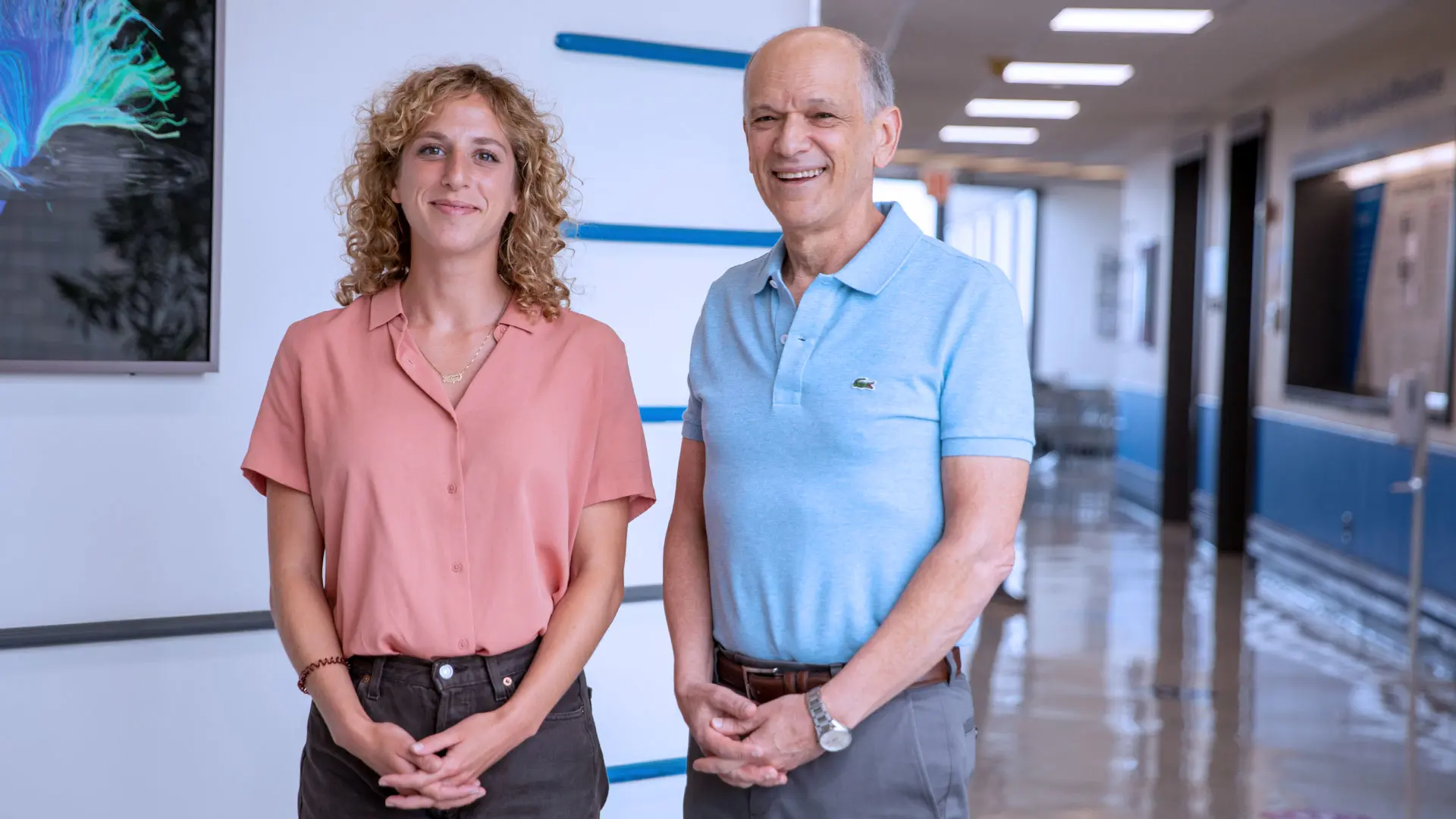
MD/PhD candidate Hope Kronman, PhD (MD expected in 2022) with Eric J. Nestler, MD, PhD
Few know the value of a strong mentor better than Eric J. Nestler, MD, PhD, Nash Family Professor of Neuroscience, Director of The Friedman Brain Institute, and Dean for Academic and Scientific Affairs. While a PhD student at Yale University, Dr. Nestler came under the wing of Nobel laureate Paul Greengard, starting a lifelong relationship that he drew on repeatedly for sage advice about his career, science, and much more. “Paul became like a father to me, and I’ve tried to model my own mentoring based on my experience with him,” says Dr. Nestler. “I think about ‘paying it forward’ now with my own students and postdocs.”
One of the beneficiaries has been Hope Kronman, PhD, an MD/PhD student in Neuroscience who has worked in the Nestler Lab for the past six years. The two have developed a highly productive and rewarding mentor–mentee relationship. “He constantly advises me on the design of experiments and the overarching direction of my research, but I’ve also come to Eric with questions about my personal life and other things outside the lab,” says Dr. Kronman, who recently earned her PhD and is beginning her fourth year of medical school in the MD/PhD program at the Graduate School of Biomedical Sciences at the Icahn School of Medicine at Mount Sinai. “He has an open-door policy, and no matter how busy he is, he somehow finds time to talk.”
“I dug deep into neuroepigenetics and was able to learn from some of the world’s leading experts in single-cell biology.”
–MD/PhD candidate Hope Kronman, PhD
The Nestler Lab has advanced the understanding of the molecular mechanisms of drug addiction and depression—in particular, drug- and stress-induced changes in gene expression and chromatin structure within the brain’s reward circuitry, and the mechanisms by which those lasting adaptations alter neuronal and circuit function to produce behavioral abnormalities. This proved to be an excellent fit for Dr. Kronman, who is pursuing research in psychiatry and cognitive science. “I dug deep into neuroepigenetics and was able to learn from some of the world’s leading experts in single-cell biology,” she says. “I felt an incredible breadth and depth of support.”
From her dogged lab work emerged a major 2021 study in Nature Neuroscience, where Dr. Kronman was the lead author and Dr. Nestler the senior author. The team revealed that an epigenetic modification that occurs in a major cell type in the brain’s reward circuitry controls how stress early in life increases susceptibility to additional stress in adulthood. Dr. Nestler described Dr. Kronman’s input as “a tour de force piece of work” on an investigation that was important for his lab. Their work also discovered that a small molecule inhibitor of the enzyme responsible for this modification, which is currently being developed as an anticancer drug, was able to reverse in animal models this increased vulnerability to lifelong stress.
"Biomedical research requires technical and intellectual skills along with incredible motivation and work ethic,” says Dr. Nestler. “Hope is that rare individual who combines all of those strengths, and always brings a smile no matter how tough the challenge in the lab or her personal life.”
Mount Sinai is No. 2 in NIH funding for neuroscience
Dr. Kronman has taken full advantage of her mentoring opportunities at Mount Sinai within the Nash Family Department of Neuroscience, No. 2 in National Institutes of Health funding for Neuroscience (Blue Ridge Institute for Medical Research data among U.S. medical schools, fiscal year 2020). Within the Department, Dr. Nestler and Paul J. Kenny, PhD, Ward-Coleman Professor and Chair, and Director of Mount Sinai’s Drug Discovery Institute, also are Top 10 principal investigators nationally for individual neuroscience funding.
"I’ve become much more confident as a scientist in my ability to design experiments and to trust my intuition,” says Dr. Kronman. “I’ve learned so much, too, about collaborating with others, and Eric has been instrumental in that regard. He knows how to give people appropriate credit and how to leverage his skills and those of everyone in his network to do the best science.”
Adds Dr. Nestler: “I expect her to be one of the leading investigators in psychiatric neuroscience for decades to come.”
How Passion and Encouragement Allowed a PhD Candidate To Build on the Groundbreaking Work of Her Mentor and Make Her Own Discoveries
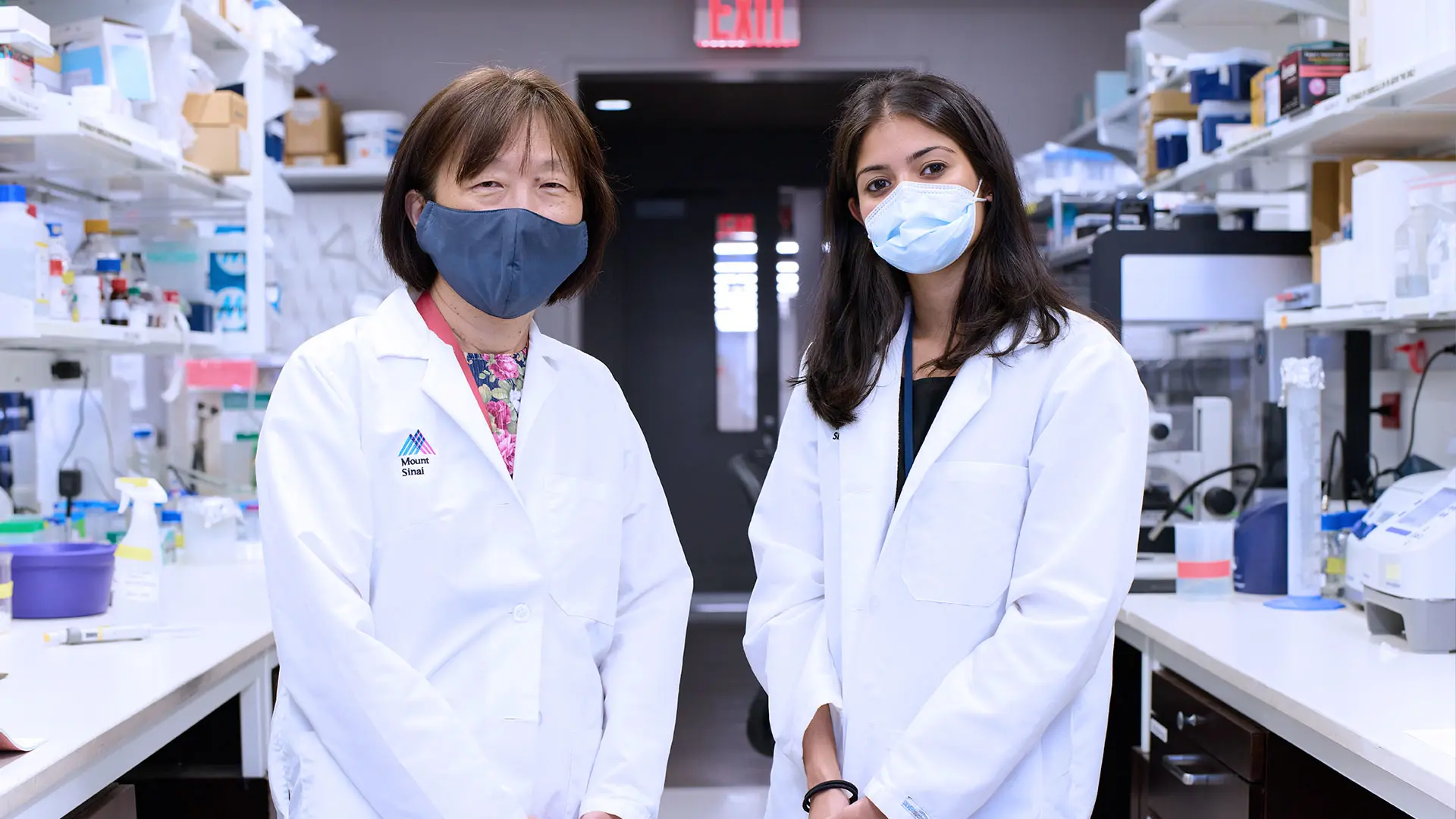
Judy H. Cho, MD, left, with Shikha Nayar, PhD, who received her degree in 2021
Experience has shown that the best mentor–mentee relationships allow each party to learn generously from the other. There are few better examples than a partnership that has grown since 2017 between Judy H. Cho, MD, Dean of Translational Genetics at the Icahn School of Medicine at Mount Sinai, and Shikha Nayar, PhD. Dr. Nayar recently completed her degree at Icahn Mount Sinai’s Graduate School of Biomedical Sciences in the lab of Dr. Cho, a legendary researcher who has defined the genetic architecture underlying inflammatory bowel disease.
Judy H. Cho, MD, uncovered the first gene for Crohn’s disease in 2001
20 years later, PhD student Shikha Nayar made her own big discovery
In 2001, Dr. Cho discovered the first gene, NOD2, for Crohn’s disease, a breakthrough published in Nature. But the underlying biology remained a mystery—until 20 years later when her mentee, Dr. Nayar, leveraged advances in single-cell technology and her own intense energy and scientific curiosity to bring some closure by dissecting the molecular markers of the disease. “While Judy originally identified the genetic mutation that greatly increased the risk of Crohn’s disease, our paper reconciled the cellular changes and activated proteins present in the NOD2 mutation, and how they could explain why 40 percent of Crohn’s disease patients don’t respond to anti-TNF [tumor necrosis factor] therapy,” says Dr. Nayar.
It seemed only fitting that the new paper—with Dr. Nayar as first author and Dr. Cho as senior author—was published in Nature in March 2021.
Characteristically, Dr. Cho, who is also Director of The Charles Bronfman Institute for Personalized Medicine and Professor of Pathology, Molecular and Cell-Based Medicine; Genetics and Genomic Sciences; and Medicine (Gastroenterology) is quick to recognize her partner’s contribution.
“She led the whole project,” Dr. Cho says, “which just shows her incredible versatility—how mature and well organized she is, and how excited and driven she is by science. She has a very nice scientific temperament.” Indeed, it was Dr. Nayar, she explains, who decided to switch mid-study to a therapeutic target different from the one initially planned. “She was so eager to make progress while waiting for the mutant zebrafish to develop that she took a flyer on an agent that turned out to be a really cool idea,” Dr. Cho recounts.
“The opportunities here for translational research are incredible.”
–Shikha Nayar, who received her PhD in 2021
Opportunities include access to patient-specific samples for research
For Dr. Nayar, the Cho Lab has proven to be highly fertile terrain for her ideas, skills, and enthusiasm. “The opportunities here for translational research are incredible,” she explains. “We have access to patient-specific samples that we are able to incorporate into our research, as well as to state-of-the-art single-cell technologies to help us better understand the heterogeneity between patients. I’ve tried to tap into all of these resources.”
Perhaps her greatest resource, however, has been her Graduate School mentor, who has served as a sturdy role model for her both scientifically and for the leadership qualities that have garnered her so much respect in medical and research communities.
“Seeing how Judy is able to navigate difficult situations and relationships has been really inspirational for me, especially because I have always been involved in student leadership,” says Dr. Nayar. At Mount Sinai, her activities have included serving as PhD student-body advocate through her work on the Student Council, as well as an advocate for women in science.
Now considering a career outside the traditional academic pathway—perhaps in a small biotech firm, health technology, or in scientific editing—Dr. Nayar knows she can count on the unqualified support of her mentor. Says Dr. Cho, “She will succeed no matter what venue she chooses. I just want her to be happy and to remain engaged by science.”
How Training at Mount Sinai's Spine Bioengineering Lab
Launched the Career of a Stellar Junior Scientist
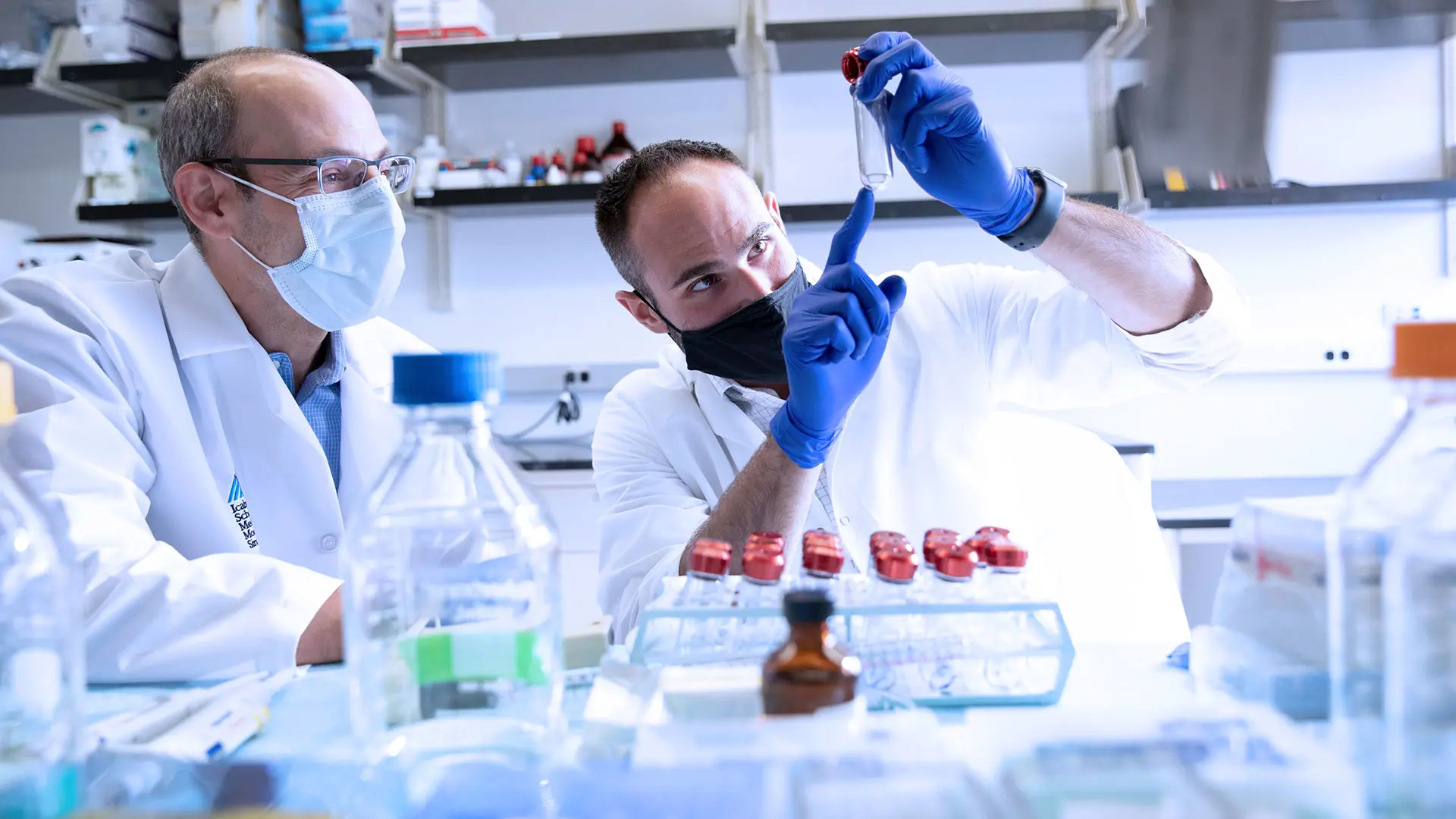
James C. Iatridis, PhD, left, with Tyler DiStefano, PhD, who received his degree in 2021
James C. Iatridis, PhD, Mount Sinai Professor and Vice Chair for Research in the Leni and Peter W. May Department of Orthopedics, recalls when PhD student Tyler DiStefano was running into one technical challenge after another on a complex project in the Spine Bioengineering Lab, afraid an entire year of work might be lost. “He didn’t know yet that failure is a natural part of research, and almost always a learning opportunity,” says Dr. Iatridis, who was Mr. DiStefano’s mentor. “So I talked him through the project, and he was able to pivot and come up with different solutions that ultimately worked.”
“[Dr. Iatridis] saw the potential in me before I saw it in myself, and that’s really important in the first few years for any graduate student.”
–2021 graduate Tyler DiStefano, PhD
Dr. DiStefano—he received his PhD from the Graduate School of Biomedical Sciences at the Icahn School of Medicine at Mount Sinai in May 2021—today remembers that rough patch early in his training serving as an example of the kind of steady encouragement he would receive from his preceptor over the next five years.
“He always showed me there was an optimistic side to things, especially when it was easy to get down on myself and my research,” he says. “He saw the potential in me before I saw it myself, and that’s really important in the first few years for any graduate student.”
Dr. Iatridis has vast expertise in areas that include biomechanics and bioengineering, developmental biology, mathematical modeling of biomedical systems, regeneration, and tissue engineering. The Spine Bioengineering Lab that he established aims to develop minimally invasive interventions to prevent and repair painful spinal pathologies with a focus on intervertebral disc (IVD) degeneration. It has four basic and translational research programs: IVD Repair; Painful IVD Degeneration; Diet, Diabetes, and Spine Health; and IVD Cell Biology.
Dr. DiStefano would eventually first-author four papers with Dr. Iatridis in high-profile publications. The most recent, in Biomaterials, described the development of a two-part adhesive strategy that was novel from both biomaterials and spinal disc repair perspectives. “It was a win-win for each of us, and the highlight of my graduate years,” says Dr. DiStefano.
What did Dr. Iatridis see in his student? “He was more like a junior PI than any other PhD student I’ve ever worked with,” he says. “Tyler was incredibly independent and had an ability to recruit other students to work with him to advance his research and answer critical questions on specific projects. But it went beyond collaboration—he was demonstrating real leadership skills.”
In June 2021, Dr. DiStefano joined Charles River Associates, a life sciences company in New York City. “It’s different from the traditional academic pathway,” he admits, “but I enjoy it now when people come to me to rationalize the scientific portions of projects, and I’m able to leverage the many skills I developed during my PhD training in James’s lab.”
“James was hands-off to the point where you would have to figure things out yourself. And that was when the real growth occurred in my development as an independent investigator.”
–2021 graduate Tyler DiStefano, PhD
That training proved critical to Dr. DiStefano’s maturation as a scientist in a variety of ways. “In terms of my intellectual, personal, and emotional growth, it allowed me to become both independent and a thought leader,” he says. “The biggest advantage was having the freedom to explore new ideas, pursue new questions, and test them out systematically in a
very academically rigorous environment. James was hands-off to the point where you would have to figure things out yourself. And that was when the real growth occurred in my development as an independent investigator.”
“We’re really in the business of creating scientific leaders. We’re not looking for people who are just technical experts, but for those with the vision and the ambition to grow and eventually have a big impact...”
–James C. Iatridis, PhD
Dr. Iatridis believes his mentoring approach is on track with the overarching goal of the Graduate School program. “We’re really in the business of creating scientific leaders,” he says. “We’re not looking for people who are just technical experts, but for those with the vision and the ambition to grow and eventually have a big impact on whatever field of science they decide to enter.”
Throughout his PhD candidacy, it turns out that Dr. DiStefano displayed a variety of leadership qualities. As a gay man, he founded the Mount Sinai chapter of OSTEM (Out in Science, Technology, Engineering and Mathematics). “When I came out my first year of graduate school,” he says, “I couldn’t have found a more welcoming environment, a safe space to be myself and realize the importance of diversity and inclusivity for every member of the student body.”
How a Third-Year PhD Candidate Volunteered for a COVID-19 Research Project and Helped Create a
SARS-CoV-2 Assay
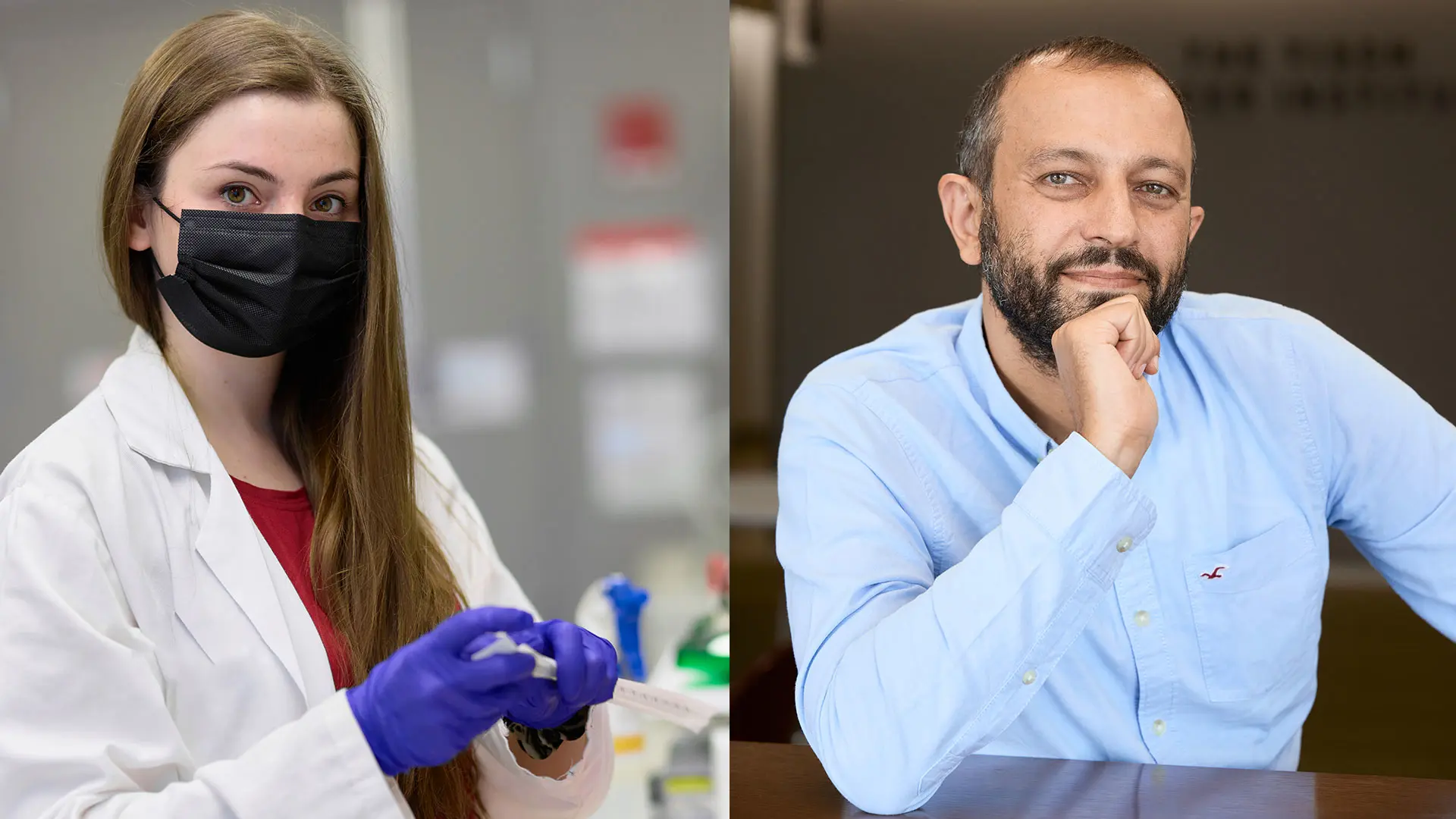
Third-year PhD student Megan Schwarz and Ernesto Guccione, PhD
At the height of the pandemic, with researchers suddenly homebound, Ernesto Guccione, PhD, Professor of Oncological Sciences, and Pharmacological Sciences at the Icahn School of Medicine at Mount Sinai, asked for volunteers to join a COVID-19 project that required their daily presence in the lab. Two PhD students of his, experimental biologist Megan Schwarz and computational biologist Denis Torre, immediately agreed to participate. Ms. Schwarz was especially eager to use this as an additional learning opportunity with Dr. Guccione, her academic mentor of two years.
PhD student helps create a COVID-19 rapid T-cell immune response test
“He always taught me to take ownership for projects, which meant working independently and thinking critically by myself.”
–Megan Schwarz, third-year PhD candidate
"He always taught me to take ownership for projects, which meant working independently and thinking critically by myself," she explains. Those proved to be particularly valuable assets for this project—developing a rapid T-cell immune response test for COVID-19 where the clock was ticking and the resources were limited. “I had to deal with something very new to me under immense time pressure,” she recalls. “I was suddenly on the phone with other researchers from Singapore and Spain, and I learned how to work collaboratively and quickly to try and get this test out of the lab and into hospitals so it could begin helping people.”
For her efforts, which involved working closely with Dr. Guccione, Ms. Schwarz was awarded Mount Sinai’s Excellence in Cancer Research Award as the most outstanding early-stage PhD candidate in the Cancer Biology multidisciplinary training area. Their COVID-19 assay can be performed overnight to indicate whether a person has cellular immunity to various SARS-CoV-2 peptides. Ms. Schwarz is first author of an upcoming paper based on their research.
“We were seeking something completely new and unexplored, so we were on the phone three and four times a day as we learned together what worked and what didn’t,” Dr. Guccione says. “She’s an absolute pleasure to work with and very enthusiastic.” Still fresh in his mind is the triumphant moment shared by both professor and student when they realized they had developed a very simple and practical qPCR-based assay that actually worked.
Entering the third year of Mount Sinai’s Biomedical Sciences PhD program, Ms. Schwarz says she was drawn to the Guccione Lab because of its translational focus. “Doing work that is commercializable and entrepreneurial and has a direct impact on patient populations is what I’ve always been interested in,” she says.
But her interests also range to oncologic research, an area where Dr. Guccione has advanced understanding of the basic mechanisms of transcriptional and post transcriptional regulation to identify therapeutic opportunities. Ms. Schwarz’s thesis project is on the role of PRDM15, a novel oncogenic protein that has been well studied in the past by the Guccione Lab in the context of lymphoma. Her project is now expanding that work by linking it to hepatocellular carcinoma, a subset of liver cancer.
Ms. Schwarz’s investigation has not always gone smoothly. At one point, she realized that some of the basic assumptions underlying her research were incorrect, and that six months of labor were in jeopardy. She immediately leaned on her mentor for advice, who related to her a similar experience when he was two and a half years into his own PhD thesis. “That made me feel better, but what impressed me most was how quickly he responded to me, and how much he cared,” she recalls. “We just sat there and brainstormed how to adapt to the new challenge, and suddenly things took a positive spin. It became clear to me how to move forward.”
“I’m always there to direct and guide students, but they need to figure out what works and what doesn’t.”
–Ernesto Guccione, PhD
Implicit in that moment is Dr. Guccione’s distinct mentorship style, honed by his own postdoctoral mentor at the European Institute of Oncology in Milan, Italy. “He gave me the freedom to make mistakes and to learn, but he never micromanaged,” Dr. Guccione remembers. “And that’s how I’ve tried to be as a mentor. I’m always there to direct and guide students, but they need to figure out what works and what doesn’t.”
